Research Faculty
 |
Kenneth Campellone, Professor, Ph.D. Cellular microbiology, E.coli O157, host-pathogen interactions, toxin trafficking, type 3 effector proteins. Campellone Lab Website |
 |
Daniel Gage, Professor, Ph.D. and Associate Head of Undergraduate Research and Education Plant-microbe interactions, microbial genetics and physiology of infection in the Rhizobium-legume symbiosis. Gage Lab Website |
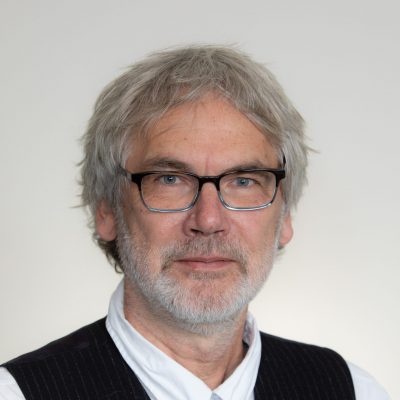 |
J. Peter Gogarten, Board of Trustees Distinguished Professor, Ph.D. Microbial evolution and phylogeny; comparative genome analyses; horizontal gene transfer; early evolution of life. Gogarten Lab Website |
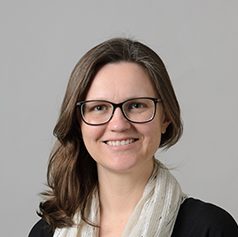 |
Sarah Hird, Associate Professor, Ph.D. Evolution and ecology of host-associated microbiota, avian gut microbiota, microbial phylogeography, microbial ecology, bioinformatics, ornithology. Hird Lab Website |
 |
Jonathan Klassen, Assistant Professor, Ph.D. and Microbiology Head Microbial community ecology, especially using the fungus-growing ant symbiosis as a model system to study the evolution of microbial interaction networks; microbial natural product genomics, evolution, and chemical ecology. Klassen Lab Website |
 |
Spencer Nyholm, Professor, Ph.D. Host-microbe interactions, squid / Vibrio fischeri symbiosis (colonization, interactions with the innate immune system), functional genomics of hydrothermal vent symbioses. Nyholm Lab Website |
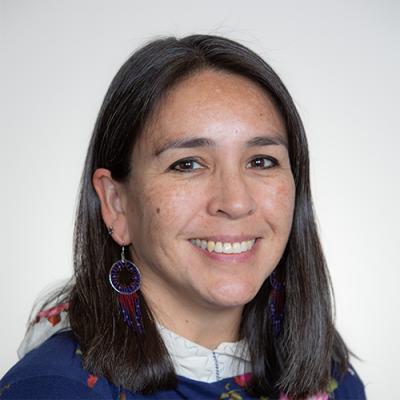 |
Kat Milligan-McClellan, Assistant Professor, Ph.D. How host genetic background contributes to the balance between the immune response to microbiota in the gut and intestinal microbial membership. Milligan-McClellan Lab Website |
 |
Michel Geovanni Santiago-Martinez (Geo) Assistant Professor, Ph.D. Our Microbial Ecophysiology Lab is focused on understanding the regulation of cellular processes in methanogenic and non-methanogenic archaea, and their actual role in free-living environments and microbiomes associated to animals and plants. |
 |
Carolyn Teschke, Professor, Ph.D. Bacteriophage assembly in vivo and in vitro; structural, biochemical, mutational analysis of bacteriophage capsids; macromolecular protein assembly Teschke Lab Website |
Teaching Faculty
 |
Michelle Maltz-Matyschsyk, Associate Professor-in-Residence, Ph.D. |
 |
Patricia Rossi, Associate Professor-in-Residence, Ph.D. Undergraduate education, germination pathways in Bacillus spp., soil microbiology and novel antibiotic production from environmental bacteria. |
Affiliated Faculty in other Departments
| Steven Geary, Professor, PhD Pathobiology and Veterinary Science 1) Mycoplasma comparative and functional genomics. (2) Analysis of virulence determinants and variably expressed surface proteins of mycoplasmas. (3) Vaccine development and immunologic and genetic means of analysis for the detection of mycoplasmas. |
|
| Pieter Visscher, Professor, PhD Marine Sciences Biogeochemical processes in oceanic environments, the fate of methanethiol, dimethylsulfide, methyl bromide and methyl chloride in oceanic waters. |
See the Center for Microbial Systems, Ecology and Evolution (CMSEE) for a listing of other microbiologists at UConn.
Emeriti
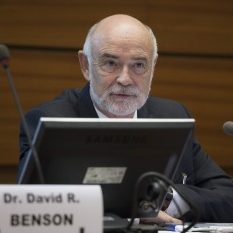 |
David Benson, Professor Emeritus, Ph.D. Microbial physiology and prokaryotic molecular biology. Evolution and molecular ecology of plant microbe symbioses in actinorhizal plants. Physiology, biochemistry, and evolution of bacteria. Ecology and diversity of microorganisms in foods. Frankia Website |
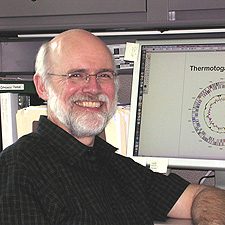 |
Kenneth Noll, Professor Emeritus, Ph.D. The physiology and evolution of hyperthermophilic organisms. Of particular interest are the organisms of the bacterial order Thermotogales. Recent work has focused on the evolution of sugar transporters in this lineage and the horizontal transport of genes encoding transporters between members of the Thermotogales and archaea. Noll Website |
| Thomas Terry, Professor Emeritus, Ph.D. Microbiology education, developing new approaches and materials for microbiology educators, Web-based teaching. |
|
| Robert Vinopal, Professor Emeritus, Ph.D. Microbial physiology and genetics applied to biotechnology and environmental microbiology, antimicrobial and biocidal agents, synthetic biodegradable polymers, biodegradation. |